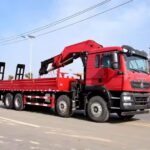Tow truck-mounted cranes play a crucial role in the recovery and transportation of vehicles, offering a versatile solution for a variety of situations. From lifting disabled cars to recovering wreckage at accident sites, these cranes are indispensable in the towing industry. Jednakże, like any mechanical equipment, regularna konserwacja is essential to ensure their optimal performance, longevity, I, most importantly, bezpieczeństwo. W tym artykule, we delve into the key aspects of tow truck-mounted crane maintenance, offering valuable insights for operators and fleet managers.
Understanding the Components:
Before delving into maintenance practices, it’s vital to understand the primary components of a tow truck-mounted crane. These cranes typically consist of a boom, winch, hydraulic system, and various supporting structures. The boom is responsible for lifting and lowering loads, while the winch assists in the extension and retraction of the cable. The hydraulic system powers these movements, making it a critical component. Regular inspection and maintenance of these elements are essential to prevent breakdowns and ensure the crane’s smooth operation.
Routine Inspection Checklist:
1. Visual Inspection:
Conduct a thorough visual inspection of the entire crane, looking for any signs of wear, damage, or corrosion. Pay special attention to welds, joints, and hydraulic connections.
2. Boom and Winch Examination:
Check the boom for any cracks, dents, or deformities. Inspect the winch cable for fraying, kinks, or other signs of damage. Ensure the cable is spooled evenly to prevent uneven loads during operation.
3. Hydraulic System Check:
Examine the hydraulic hoses and connections for leaks or damage. Test the hydraulic fluid levels and quality, and replace or top up as necessary. Proper hydraulic function is critical for the crane’s smooth operation.
4. Lubrication:
Ensure all moving parts, such as joints, hinges, and pulleys, are adequately lubricated. Lubrication prevents friction-related wear and tear and enhances the overall efficiency of the crane.
5. Electrical System Inspection:
Check the electrical components, including lights and control panels, for functionality. Faulty electrical systems can compromise safety and the crane’s overall performance.
6. Structural Integrity:
Assess the overall structural integrity of the crane, focusing on the chassis and supporting structures. Any signs of rust or structural weaknesses should be promptly addressed to prevent catastrophic failures.

Periodic Maintenance Tasks:
1. Regular Fluid Changes:
Schedule regular hydraulic fluid changes according to the manufacturer’s recommendations. Clean fluid ensures optimal performance and prevents damage to hydraulic components.
2. Load Testing:
Periodically conduct load tests to ensure the crane can handle its rated capacity safely. This helps identify potential issues with the winch, cables, and hydraulic system under load conditions.
3. Calibration of Controls:
Calibrate control systems to ensure accurate and precise operation. Misaligned or inaccurate controls can lead to accidents and damage to the crane or the towed vehicle.
4. Certification Renewal:
Stay up-to-date with certification requirements for tow truck-mounted craneS. Ensure that your equipment complies with safety standards, and renew certifications as needed.
5. Training and Operator Competence:
Regularly train and evaluate crane operators to ensure they are familiar with the equipment and its safe operation. Competent operators are crucial for accident prevention and overall fleet safety.
Emergency Preparedness:
1. Emergency Stop Tests:
Regularly test the emergency stop function to ensure its immediate and effective response. This is a critical safety feature that can prevent accidents in emergencies.
2. Backup Systems Check:
Verify the functionality of backup systems, such as manual controls or secondary power sources. These systems can be crucial in the event of a primary system failure.

Conclusion:
Tow truck-mounted cranes are indispensable tools in the towing industry, and their proper maintenance is essential for safe and efficient operation. By implementing a comprehensive maintenance program that includes routine inspections, periodic tasks, and emergency preparedness measures, operators and fleet managers can ensure the longevity and reliability of their equipment. Ponadto, adherence to safety standards and regular training for operators are crucial elements in preventing accidents and ensuring the well-being of both personnel and the public. Mastery of tow truck-mounted crane maintenance is not just a best practice; it’s a commitment to safety and professionalism in the towing industry.









